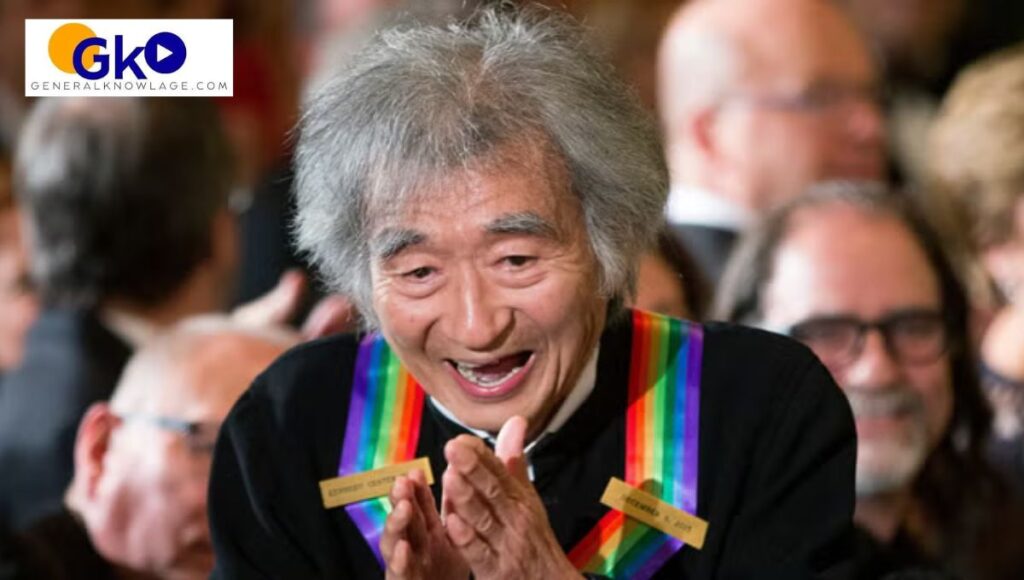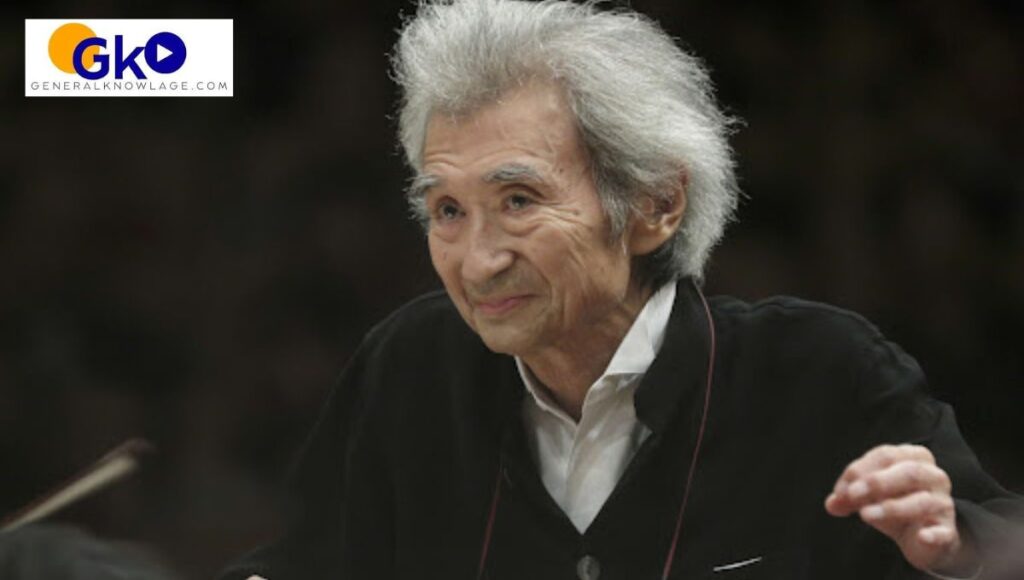Seiji Ozawa Health, Wiki, Wikipedia, Death, Wife, Died, Age, Children, Family
Seiji Ozawa Health, Wiki, Wikipedia, Death, Wife, Died, Age, Children, Family – Seiji Ozawa was an extraordinary conductor who left an indelible mark on the world of classical music. Born on September 1, 1935, in Mukden, China, he became renowned for his passionate and charismatic conducting style, collaborating with top orchestras and soloists worldwide. His dedication to music and cultural exchange earned him widespread admiration and accolades. Sadly, he passed away on February 6, 2024, at the age of 88, leaving behind a rich legacy cherished by many.

Seiji Ozawa Early Life
Seiji Ozawa’s musical journey began at a tender age. Born into a family in Mukden, China, he exhibited a keen interest in music from his childhood. His father, a dentist, and his mother encouraged his passion. At the age of four, he started playing the piano, later adding violin and harmonica to his repertoire. This early exposure laid the foundation for his future career as a maestro.
| Name | Seiji Ozawa |
| Birth Date | September 1, 1935 |
| Birth Place | Mukden, China |
| Death Date | February 6, 2024 |
| Death Place | Tokyo, Japan |
| Occupation | Conductor |
Seiji Ozawa Measurements
| Height | 6 feet (183 cm) |
| Weight | 165 lbs (75 kg) |
| Hair Color | Black |
| Eye Color | Brown |
Seiji Ozawa Education Qualification
Ozawa’s formal musical education began when he moved to Japan with his family at the age of 16. Enrolling in the prestigious Toho Gakuen School of Music in Tokyo, he honed his skills in violin, piano, and conducting. Under the guidance of his mentor, Hideo Saito, Ozawa’s talent flourished. This educational foundation paved the way for his illustrious career in classical music.
Seiji Ozawa Family Background
Seiji Ozawa hailed from a supportive and nurturing family background. Born as the third of four children, he shared his musical journey with his siblings, two brothers, Toshio and Mikio, and a sister, Katsumi. Despite the challenges of relocation and cultural transitions, Ozawa’s family provided him with unwavering encouragement, shaping him into the maestro he became.
| Siblings | Toshio, Katsumi and Mikio |
| Parents | Not Known |

Seiji Ozawa Relationship
Ozawa’s personal life witnessed its share of joys and challenges. He was married twice in his lifetime. His first marriage was to Kyoko Edo, a fellow musician whom he met at the Toho Gakuen School of Music. The union bore two children, Yukiyoshi and Seira, before ending in divorce. His second marriage to Miki Irie, a former Miss Japan, lasted until his passing. Despite the demands of his career, Ozawa cherished his family life, finding solace and support in his loved ones.
| Spouse | Kyoko Edo (1962-1966), Miki Irie (1968-2024) |
| Children | Yukiyoshi Ozawa, Seira Ozawa, Seiya Ozawa (adopted) |
| Relatives | Kenji Ozawa (nephew) |
Seiji Ozawa Net Worth
Seiji Ozawa’s illustrious career as a conductor brought him not only acclaim but also considerable wealth. With a reported net worth of $93 million, Ozawa’s earnings stemmed primarily from his engagements with orchestras and opera houses worldwide. Additionally, royalties from recordings and publications contributed to his financial success. Despite his substantial wealth, Ozawa remained dedicated to his craft and philanthropic endeavors, leaving behind a lasting impact on classical music.
Seiji Ozawa Career
Seiji Ozawa’s illustrious career as a conductor spans over six decades and is marked by numerous milestones and achievements. Emerging as a prodigious talent, Ozawa’s breakthrough came in 1959 when he clinched the first prize at the International Besançon Competition for Young Conductors in France. This victory catapulted him onto the international stage, laying the foundation for a career that would redefine the landscape of classical music.
Following his success in France, Ozawa embarked on a journey of musical exploration and growth. Venturing to Europe, he studied under the tutelage of esteemed conductors such as Charles Munch, Herbert von Karajan, and Leonard Bernstein. These formative years not only honed his technical prowess but also broadened his musical horizons, enabling him to develop a distinctive conducting style characterized by passion, precision, and innovation.
In 1964, Ozawa made history by becoming the first Asian conductor to lead a major American orchestra, assuming the role of music director at the Ravinia Festival, the summer home of the Chicago Symphony Orchestra. This groundbreaking appointment thrust him into the spotlight, earning him widespread acclaim for his dynamic interpretations and electrifying performances.
Throughout the 1960s and 1970s, Ozawa’s star continued to rise as he took on prominent roles with leading orchestras and opera houses worldwide. From the New York Philharmonic to the Vienna Philharmonic, his magnetic presence on the podium captivated audiences and critics alike, solidifying his reputation as a conductor of unparalleled talent and versatility.

Seiji Ozawa Rise in Fame
Seiji Ozawa’s rise in fame mirrored his meteoric ascent in the world of classical music. With each electrifying performance and groundbreaking collaboration, he garnered increasing recognition and adulation from audiences and peers alike. His innovative interpretations of classical masterpieces, coupled with his bold forays into contemporary repertoire, captivated the imagination of music lovers around the globe, earning him a devoted following and securing his legacy as one of the preeminent conductors of his generation.
Ozawa’s trailblazing achievements extended beyond the concert hall, as he actively sought to bridge cultural divides and promote musical exchange on a global scale. From his pioneering efforts to introduce Western classical music to Asian audiences to his establishment of educational initiatives such as the Tanglewood Music Center, Ozawa’s commitment to fostering artistic excellence and cultural understanding left an indelible mark on the world of classical music.
Boston Symphony Orchestra
Arguably the crowning achievement of Seiji Ozawa’s career was his tenure as the music director of the Boston Symphony Orchestra (BSO) from 1973 to 2002. During his unprecedented 29-year tenure, Ozawa elevated the BSO to unprecedented heights of artistic excellence and international acclaim, cementing its reputation as one of the world’s premier orchestras.
Under Ozawa’s dynamic leadership, the BSO underwent a renaissance, expanding its repertoire to encompass a diverse range of musical styles and genres. From classical masterpieces to contemporary works, Ozawa’s visionary programming showcased the orchestra’s virtuosity and versatility, captivating audiences and critics alike.
Beyond his artistic achievements, Ozawa’s impact on the BSO extended to the realm of education and outreach. His establishment of the Tanglewood Music Center provided aspiring young musicians with unparalleled opportunities for mentorship and professional development, ensuring the continued vitality of classical music for generations to come.
In recognition of his transformative contributions, the BSO honored Ozawa’s legacy by dedicating its new concert hall, Seiji Ozawa Hall, in 1994. This symbolic gesture underscored Ozawa’s enduring influence on the orchestra and served as a testament to his lasting legacy as one of the most revered figures in the history of classical music.

Seiji Ozawa Social Media Accounts
| Click Here | |
| Click Here | |
| Click Here |
Seiji Ozawa Facts
Seiji Ozawa’s life was replete with fascinating facts and anecdotes. From conducting Beethoven’s Ninth Symphony in China to founding the Saito Kinen Orchestra, his career was marked by innovation and cultural exchange. His unorthodox conducting attire, characterized by a white turtleneck, waistcoat, and tie, added a touch of individuality to his performances. Despite battling health issues later in life, Ozawa’s passion for music remained undiminished, inspiring generations of musicians and music lovers alike.
Conclusion
In conclusion, Seiji Ozawa’s legacy as a conductor extraordinaire transcends generations. From his humble beginnings in Mukden, China, to his iconic performances with the world’s leading orchestras, Ozawa’s impact on classical music is immeasurable. His unwavering dedication to his craft, coupled with his commitment to cultural exchange and education, cements his place as one of the most influential figures in the history of music. As we reflect on his remarkable life and career, we honor Seiji Ozawa’s enduring legacy and the timeless beauty of his music.
Also, Read
- Major General Charlie Herbert Wikipedia, Wiki, Army, Regiment, Age, Military
- Amol Rajan Children, Wife, Wikipedia, Parents, Masterchef, Instagram, Family, Height
- Richard Branson Ethnicity, Wikipedia, Wealth, Throw Water, Net Worth, Biography, Wife
Where is Seiji Ozawa now?
Seiji Ozawa, the famous conductor, passed away at his home in Tokyo due to heart failure. He was at home when he died. Ozawa was renowned for leading the Boston Symphony Orchestra for nearly three decades, from 1973 to 2002.
How old is Seiji Ozawa?
Seiji Ozawa, the beloved Japanese conductor, has passed away at the age of 88. His energetic and captivating performances with the Boston Symphony Orchestra captivated audiences worldwide for over thirty years.
Is Seiji Ozawa married?
Seiji Ozawa was married to Miki Irie, also known as Vera, who was a former model and actress. She was born in Yokohama in 1944 and had both Russian and Japanese heritage. Prior to his marriage to Irie, Ozawa was married to pianist Kyoko Edo. With Irie, Ozawa had two children: a daughter named Seira and a son named Yukiyoshi.
Who was the Japanese classical conductor?
Seiji Ozawa, born on September 1, 1935, in Hoten, Manchukuo (now part of China), was a highly respected conductor known for his dynamic style. He became fascinated with Western music as a child in Japan and later pursued a career in conducting rather than as a pianist, as he initially hoped.
What is Seiji Ozawa famous for?
Seiji Ozawa gained fame as the music director of the Boston Symphony Orchestra, a position he held from 1973 to 2002. His tenure of 29 years was the longest in the orchestra’s history, surpassing even the legendary Serge Koussevitzky. Ozawa was born in 1935 in Shenyang, China, and his remarkable career as a conductor left an enduring legacy in the world of classical music.

